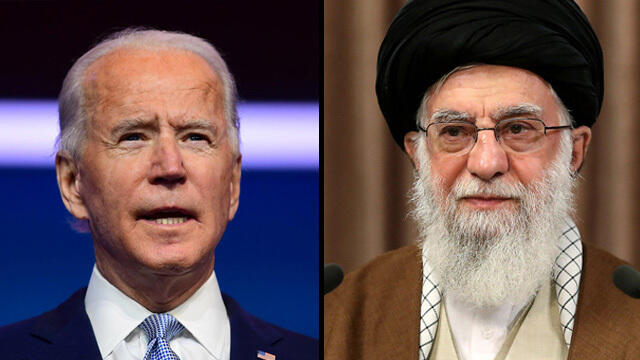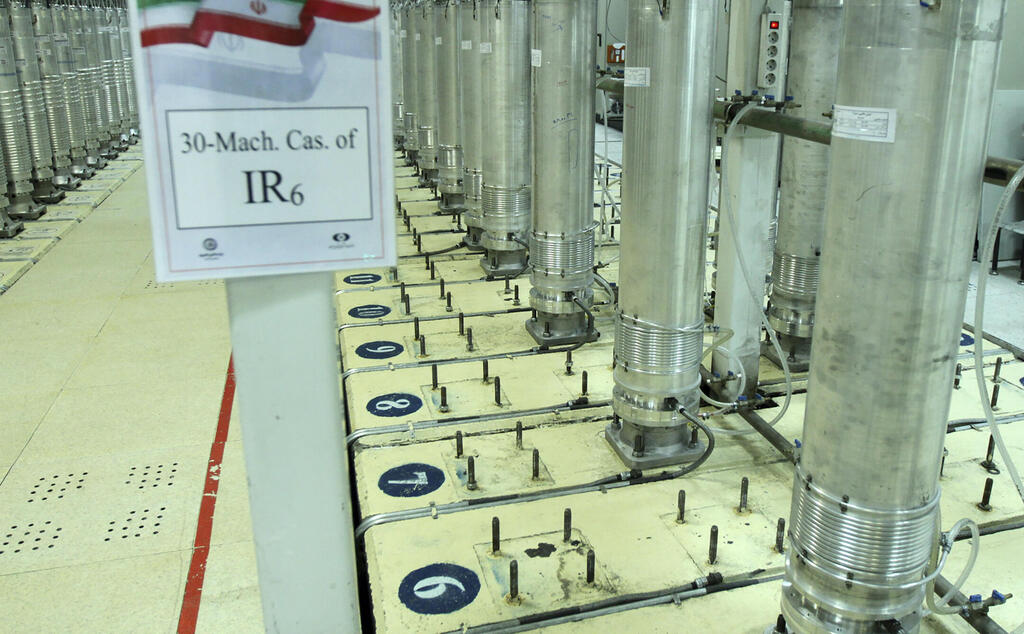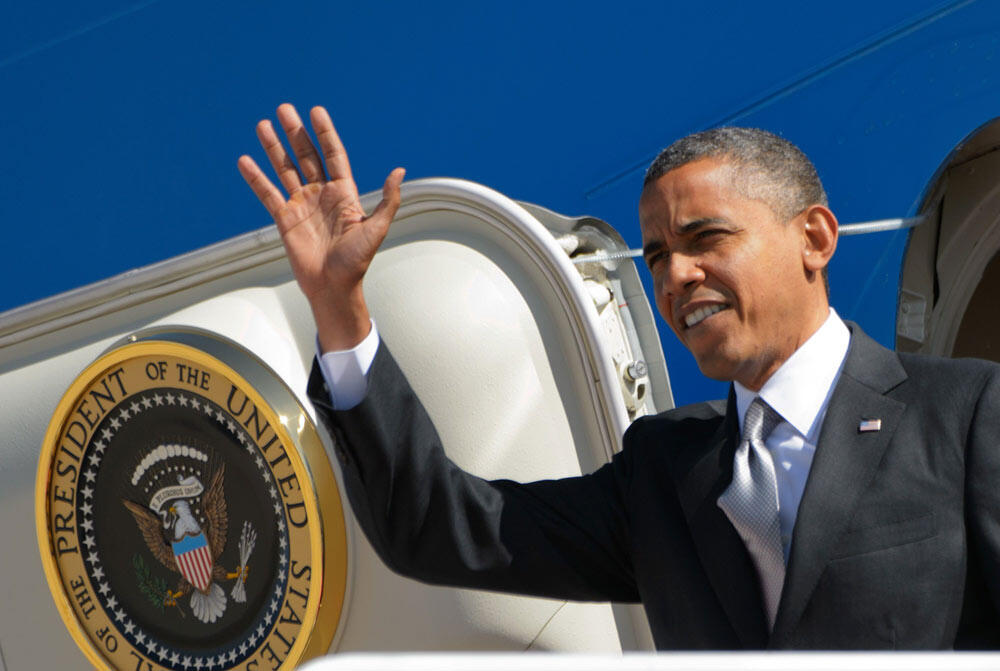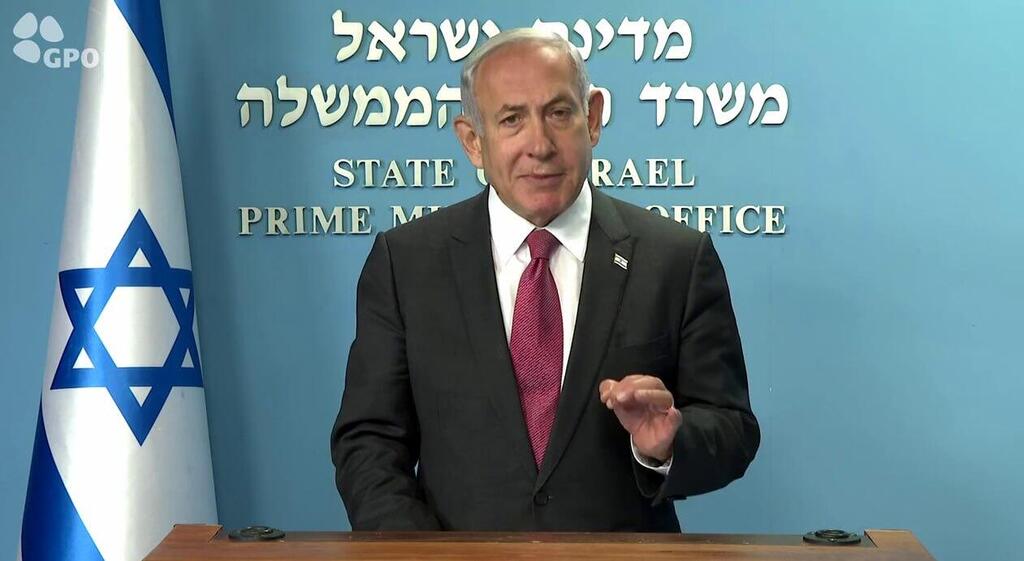Israeli and foreign media sources have been reporting that the United States and Iran are close to an “understanding“ regarding the latter’s nuclear program. Under the deal, Tehran will accept some limitations on its program—specifically not to enrich uranium above the 60 percent level—in exchange for Washington unfreezing Iranian assets to the tune of almost $20 billion held by third parties.
Read more:
Reportedly, Prime Minister Benjamin Netanyahu confirmed during a June 13, closed-door meeting with the Knesset Foreign Affairs and Defense Committee that Washington and Tehran are nearing what he termed a “mini-agreement.”
5 View gallery


U.S. President Joe Biden and Iranian Supreme Leader Ayatollah Ali Khamenei
(Photo: AFP, Reuters)
If such a bargain is finally struck it would be the result of a shrewd Iranian game of nuclear chicken. In fact, it would amount to Iran exercising nuclear blackmail vis-a-vis both the U.S. and Israel without actually possessing the bomb.
The deal currently being negotiated is aimed to rein in Iran’s supposed race to the bomb. Yet there is little doubt the billions of dollars released would be used by the mullahs to entrench the regime and, worse yet, to expand and upgrade their long-range delivery capabilities, especially Iran’s sizable ballistic and cruise missile forces and its drone arsenal.
Tehran would thus not only pose a greater threat to U.S. regional allies and interests but could also boost its support for its new strategic ally—Russia—in the latter’s war in Ukraine.
Further, the new monies will undoubtedly be used to upgrade and augment Iran’s proxy forces across the Middle East especially those confronting Israel in Lebanon, Syria, the Gaza Strip and increasingly the West Bank.
Even if the deal itself contains mechanisms to prevent such uses of the unfrozen assets, Iran would be able to utilize the new funds to engineer a swap—it could free up budgets currently allocated for non-military purposes and divert the sums previously earmarked for peaceful ends to intensify its relentless effort to push the U.S. out of the region and undermine its allies.
Incredibly if this “mini-agreement“ takes effect the Biden Administration would in effect trade a longer-term potential threat for markedly exacerbating the immediate ones posed to its own interests and those of its allies and in particular to Israel. Since such a tradeoff makes little strategic sense, the question naturally arises as to how was Iran able to accomplish it?
It seems certain the answer has to do with the lessons Iran had learned from the 2015 nuclear negotiations which produced the Joint Comprehensive Plan Of Action (JCOPA). At that time Israeli leaders, alarmed by Iran’s advances in its nuclear program, increasingly threatened to take action to preempt it. The warnings unsettled Washington.
Indeed U.S. President Barack Obama in justifying the JCOPA stated “Let’s not mince words. The choice we face is ultimately between diplomacy or some form of war. Maybe not tomorrow, maybe not three months from now, but soon.”
Iran thus learned that it can rely on Israel’s reaction to its nuclear activities and on U.S. indetermination to avoid another military entanglement in the Middle East to serve its purposes. By becoming a “threshold state” which could breakout to the bomb on short notice, Iran would create enough uncertainty as to its nuclear intentions to force Israel to react.
In turn, Washington’s apprehensions about a Middle East conflagration as a result of a possible Israeli attack on Iran’s nuclear facilities would mount. The U.S. would again be compelled to seek an agreement on Tehran’s terms so as to thwart Israel’s military plans.
At the minimum, Tehran learned that its nuclear program provides it with important leverage with which it could drive a serious wedge between Jerusalem and Washington.
What is more, the approaching U.S. presidential elections must have been viewed in Tehran as a golden opportunity for exercising nuclear brinkmanship. The mullahs certainly assessed that during this period Washington’s objections to any foreign military adventure would become even more pronounced and thus the urgency of concluding a nuclear deal to block Israel would be even greater.
Not surprisingly, the steps taken by the Biden administration are thus cast as an "understanding" rather than an agreement that would require review by the U.S. Congress, where many lawmakers oppose giving Iran benefits because of its military aid to Russia, its domestic repression and its support for proxies that have attacked U.S. interests in the region.
All that was needed to set off this scenario was to mobilize Israel into action. Israel did not disappoint. Apparently unable to ignore Iran’s nuclear provocations, Israeli leaders, by words and deeds, signaled with growing frequency that a military operation to destroy Iran’s nuclear facilities is being prepared.
Ironically, as in 2015, it is Netanyahu who again voices staunch opposition to a nuclear compromise with Tehran pledging anew that “Israel will not be bound by any deal with Iran and will continue to defend itself.”
He must realize, however, that if a deal is reached any action will be exceedingly more difficult to execute diplomacy-wise and significantly less effective militarily if carried out without U.S. backing and operational support. All in all not a bad outcome for the mullahs’ version of a game of nuclear chicken.
- Dr. Avigdor Haselkorn is a strategic analyst and the author of books, articles and op-eds on national security issues.





